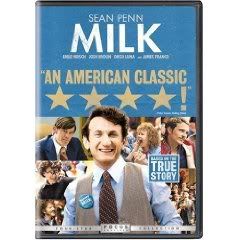At this point, I think it's safe to say that we can all depend on Sean Penn. What an amazingly versatile actor, gifted with the ability to transform himself into virtually anyone from virtually any background. Even the God-awful 2006 remake of "All the King's Men" was made better by his portrayal of Willie Stark. He shines once again in Gus Van Sant's "Milk," a film that chronicles the final years of Harvey Milk, who became the first openly gay man to be elected into public office in California. Before his assassination in 1978, he managed to become a member of the San Francisco Board of Supervisors and was the driving force behind a number of demonstrations that challenged many anti-gay initiatives. His story could not be more perfectly timed; I live in California, where, in the last election, a proposition to ban same-sex marriage (Prop 8) was put on the ballot. I'm sorry to say that it passed (although, as of the date of this writing, the ruling is being challenged in California's Supreme Court). But social and political commentaries aren't the sum of the film's parts. "Milk" is a rich, enlightening character study, probing deeply into the minds of very different people. This brings me back to Sean Penn, who certainly had his work cut out for him as the title character. As an activist, Milk was such a unique personality--outrageous, bold, and even a bit theatrical, yet refreshingly earnest and straightforward at the same time. His beginnings, on the other hand, were much more conservative, and he kept it that way throughout most of his adult life. The story proper begins in 1970 on the eve of his fortieth birthday, at which point he's an insurance statistician in New York City. On the steps of a deserted subway station, he meets Scott Smith (James Franco). The two quickly become lovers, move to San Francisco, and open a camera shop in the Castro district. And yet, something is missing for Milk. "I'm forty years old," he observes, "and I haven't done a thing I'm proud of." Tired of guarding his sexuality and sick of the way law enforcement has been handling hate crimes, he soon establishes himself as a community activist, advocating equality for all. It isn't long before his political ambitions grow, and by 1975, he was ready to cut his hair, abstain from marijuana, and seriously pursue a position in city government. Three all-consuming, unsuccessful campaigns drive a wedge between Milk and Smith; by the time Milk is finally elected as a representative for the San Francisco Board of Supervisors in 1977, their relationship cools to a mere friendship. At this point, Milk has recruited Cleve Jones (Emile Hirsch), a young activist, and Anne Kronenberg (Alison Pill), a lesbian campaign manager. They do whatever they can to rally supporters, especially now that Milk is trying to pass a city ordinance that would protect people--many of them teachers--from being fired because of their sexual orientation. He faces an uphill battle with the Christian Right, specifically Senator John Briggs (Denis O'Hare) and singer/former orange juice spokeswoman Anita Bryant (seen only in actual archival news footage). He faces a battle of a different kind with Dan White (Josh Brolin), a Board Supervisor Milk suspects of being a closeted homosexual, despite his staunch anti-gay stance. Indeed, there's something both odd and desperate about White's behavior towards Milk, inviting him to his son's christening, showing up at Milk's birthday party drunk and shouting that he's got issues too. As White grows more and more resentful of Milk and his inner circle of political allies--specifically Mayor George Moscone (Victor Garbor)--we see less of a political figure and more of a man on the brink of emotional collapse. There's a fascinating association between the film's political message and Van Sant's cinematic creativity. A few select moments are true narrative masterstrokes, and they each involve quiet yet profound reflections in shiny objects. One of the earliest takes place early in Milk's political career, at which point gays in San Francisco were issued whistles; when Milk arrives at the crime scene of a murdered young man, his conversation with a police officer is shown entirely as a reflection off of a blood stained whistle. Another moment takes place much later on in White's living room, after Milk had established himself as a prominent politician. White's television set displays Milk in the middle of a news interview; we see White's reflection in the bottom left corner of the screen, and while we don't know what he's thinking, we do know that he's interested in what Milk is saying. One of the most striking subplots involves Milk and his new lover, Jack Lira (Diego Luna), who quickly proves that he's ill-equipped to handle Milk's rising political clout. He's painfully insecure, and it only gets worse as Milk's schedule goes from heavy to full. Lira clings to Milk like a frightened animal, which is understandable but also pathetic. The real sorrow comes from the fact that Milk was too busy fighting a good fight to take any notice. What if he didn't have anything to fight against? What if there was no discrimination? "Milk" will no doubt inspire many people, but it's also likely to infuriate many others. If you're like me, then you might feel a little bit of both. Why are we still at a point where equality has to be fought for? Are we not in the twenty-first century? Shouldn't we have gotten over this issue a long time ago? It's sad to leave a movie theater and realize that not much has changed in thirty years.
